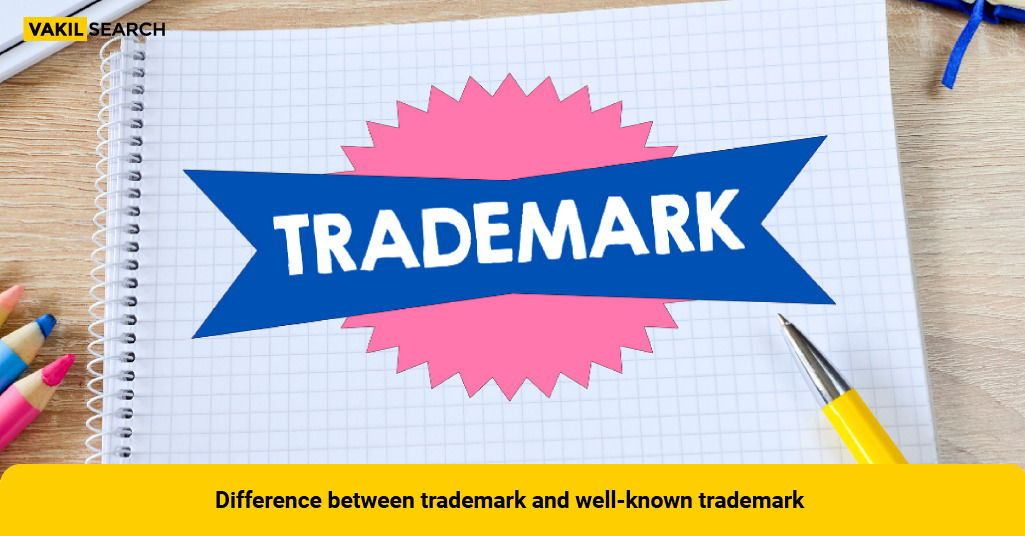This article explores the difference between trademarks and well-known trademarks in India. Understanding the distinction is crucial for businesses and consumers to protect brand identity and reputation.
Trademarks play an essential role in the business world, as they help businesses protect their brand identity and prevent others from using similar marks. In India, the Trademarks Act of 1999 governs the registration and protection of trademarks. Under this act, there are two types of trademarks: regular trademarks and well-known trademarks. In this article, we’ll explore the differences between Trademark and Well-Known Trademark and why it’s important to understand the distinction.
What is a Trademark?
Before diving into the difference between regular and well-known trademarks, let’s first define what a trademark is. A trademark is a distinctive sign, symbol, or logo a business uses to identify its goods or services and distinguish them from those of its competitors. Trademarks can be words, numbers, designs, or even colors or sounds.
Trademark registration in India protects the owner, allowing them to take legal action against any person or entity that uses their trademark without permission. Trademarks also help build brand recognition and customer loyalty, as customers associate the trademark with the quality and reputation of the goods or services the business offers.
Regular Trademarks
A regular trademark is any mark registered with the Indian Trademark Office but does not qualify as a well-known trademark. To be eligible for registration, the mark must meet the following criteria:
Distinctiveness: The mark must be unique and not similar to any existing trademarks
Non-descriptiveness: The mark should not describe the business’s goods or services
Non-deceptiveness: The mark should not be misleading or deceptive in any way
Availability: The mark should not be identical or similar to any existing trademarks.
Once registered, regular trademarks are protected under the Trademarks Act and can be used to prevent others from using similar marks. However, the level of protection offered to regular trademarks is limited compared to that of well-known trademarks.
Well-known Trademarks
A well known trademark, as the name suggests, is a mark that has gained significant recognition and reputation among the public. The Indian Trademarks Act defines a well-known trademark as a mark ‘widely known to the general public in India’ and has ‘acquired substantial goodwill’ in the market.
Well-known trademarks are afforded more protection under the law than regular trademarks. The reason for this is that they are considered more valuable and essential to the business’s brand identity. In India, the criteria for determining whether a trademark is well-known or not include:
- The extent to which the trademark is known to the relevant sector of the public, including knowledge in India and abroad
- The extent to which the trademark has been used in India or abroad
- The extent to which the trademark is recognized by any relevant authority or trade association
- The duration, extent, and geographical area of any use of the trademark
- The record of successful enforcement of rights in the trademark
- The value associated with the trademark.
Suppose a trademark is determined to be well-known. In that case, it is automatically protected against any unauthorized use, even if the goods or services being offered are different from those covered by the trademark registration. This means that if a business uses a well-known trademark in a way that is likely to cause confusion or deceive the public, it can be sued for infringement even if the goods or services being offered are completely different.
In addition, well-known trademarks are also protected from dilution, which is the use of a similar mark by another business that weakens the distinctive character or reputation of the original trademark. This means that even if the other business is not competing directly with the owner of the well-known trademark, it can still be sued for dilution.
Examples of well-known trademarks in India include Coca-Cola, McDonald’s, and Nike.
Why Is It Important to Understand the Difference?
Understanding the difference between trademarks and well-known trademarks is essential for businesses that want to protect their brand identity and reputation. By registering a trademark, businesses can prevent others from using similar marks and build brand recognition and customer loyalty. However, the level of protection offered to trademarks is limited compared to that of well-known trademarks.
On the other hand, businesses that have established a strong brand identity and reputation may want to consider registering their trademark as a well-known trademark. This will provide them with a higher level of protection and prevent others from using similar marks, even if the goods or services being offered are different.
In addition, understanding the difference between trademarks and well-known trademarks is also important for consumers. Consumers can use trademarks to identify the origin of goods or services and make informed purchasing decisions. By knowing which trademarks are well-known, consumers can also be sure they are purchasing products or services from reputable and reliable sources.
Conclusion
Trademarks play a crucial role in the business world, helping businesses protect their brand identity and reputation. In India, there are two types of trademarks: regular and well-known. Regular trademarks are any marks registered with the Indian Trademark Office but do not qualify as a well-known trademarks. On the other hand, well-known trademarks are marks that have gained significant recognition and reputation among the public and are afforded a higher level of protection under the law.
Understanding the difference between regular trademarks and well-known trademarks is essential for businesses that want to protect their brand identity and reputation, as well as for consumers who want to make informed purchasing decisions.
Vakilsearch is an online legal services platform that can help businesses register their trademarks and advise on the best action to protect their brand identity and reputation in India.
Read more,

